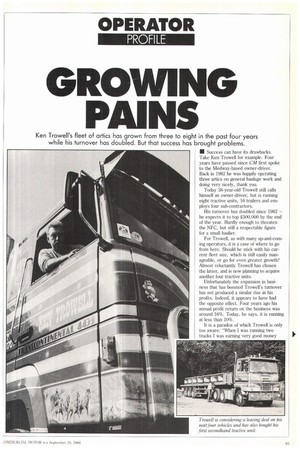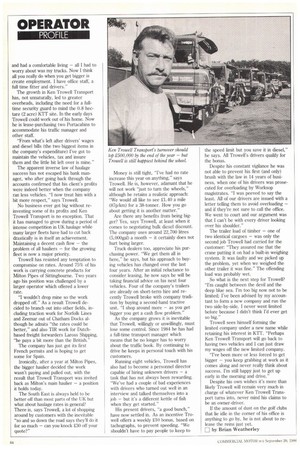GROWING PAINS
Page 65

Page 66

If you've noticed an error in this article please click here to report it so we can fix it.
Ken Trowell's fleet of artics has grown from three to eight in the past four years while his turnover has doubled. But that success has brought problems.
• Success can have its drawbacks. Take Ken Trowell for example. Four years have passed since CM first spoke to the Medway-based owner-driver. Back in 1982 he was happily operating three artics on general haulage work and doing very nicely, thank you.
Today 38-year-old Trowell still calls himself an owner-driver, but is running eight tractive units, 16 trailers and employs four sub-contractors.
His turnover has doubled since 1982 — he expects it to top £500,000 by the end of the year. Hardly enough to threaten the NFC, but still a respectable figure for a small haulier.
For Trowel!, as with many up-and-corning operators, it is a case of where to go from here. Should he stick with his current fleet size, which is still easily manageable, or go for even greater growth? Almost reluctantly Trowel] has chosen the latter, and is now planning to acquire another four tractive units.
Unfortunately the expansion in business that has boosted Trowell's turnover has not produced a similar rise in his profits. Indeed, it appears to have had the opposite effect. Four years ago his annual profit return on the business was around 16%. Today, he says, it is running at less than 10%.
It is a paradox of which Trowell is only too aware: "When I was running two trucks I was earning very good money and had a comfortable living — all I had to worry about was my trucks. Now I think all you really do when you get bigger is create employment. I have office staff, a full time fitter and drivers."
The growth in Ken Trowel] Transport has, not unnaturally, led to greater overheads, including the need for a fulltime security guard to mind the 0.8 hectare (2 acre) KTT site. In the early days Trowell could work out of his home. Now he is lease-purchasing two Portacabins to accommodate his traffic manager and other staff.
"From what's left after drivers' wages and diesel bills (the two biggest items in the company's expenditure) I've got to maintain the vehicles, tax and insure them and the little bit left over is mine."
The apparent inverse law of haulage success has not escaped his bank manager, who after going back through the accounts confirmed that his client's profits were indeed better when the company ran less vehicles. "I now treat him with a bit more respect," says Trowell.
No business ever got big without reinvesting some of its profits and Ken Trowel! Transport is no exception. That it has managed to grow during a period of intense competition in UK haulage while many larger fleets have had to cut back drastically is in itself an achievement. Maintaining a decent cash flow — the problem of all hauliers — for the growing fleet is now a major priority.
Trowell has resisted any temptation to compromise on rates. Around 75% of his work is carrying concrete products for Milton Pipes of Sittingbourne. Two years ago his position was challenged by a larger operator which offered a lower rate.
"I wouldn't drop mine so the work dropped off." As a result Trowell decided to branch out into other fields, including traction work for Norfolk Lines and Zeemar out of Chatham Docks although he admits "the rates could be better," and also TIR work for Dutchbased freight forwarders Laross Shipping, "he pays a bit more than the British."
The company has just got its first French permits and is hoping to get some for Spain.
Ironically, after a year at Milton Pipes, the bigger haulier decided the work wasn't paying and pulled out, with the result that Trowell Transport was invited back as Milton's main haulier — a position it holds today.
The South East is always held to be better off than most parts of the UK but what about haulage rates in general? There is, says Trowel!, a lot of shopping around by customers with the inevitable "so and so down the road says they'll do it for so much — can you knock 230 off your quote?"
=I
Money is still tight, "I've had no rate increase this year on anything," says Trowel He is, however, adamant that he will not work "just to turn the wheels," although he retains a realistic approach: "We would all like to see 21.40 a mile (87p/km) for a 38-tonner. How you go about getting it is another matter."
Are there any benefits from being bigger? Yes, says Trowel!, at least when it comes to negotiating bulk diesel discount. The company uses around 22,700 litres (5,000gal) a month — it certainly does not hurt being larger.
Truck dealers too, appreciate his purchasing power. "We get them all in here," he says, but his approach to buying vehicles has changed over the last four years. After an initial reluctance to consider leasing, he now says he will be taking financial advice on his next four vehicles. Four of the company's trailers are already on short-term hire and recently Trowell broke with company tradition by buying a second-hand tractive unit. "I shop around more — as you get bigger you get a cash flow problem."
As the company grows it is inevitable that Trowel!, willingly or unwillingly, must lose some control. Since 1984 he has had a full-time transport manager which means that he no longer has to worry about the traffic book. By continuing to drive he keeps in personal touch with his customers.
Running eight vehicles, Trowell has also had to become a personnel director capable of hiring unknown drivers — a task that has not always been rewarding. "We've had a couple of bad experiences with drivers who turned out well in an interview and talked themselves into a job — but it's a different kettle of fish when they get started."
His present drivers, "a good bunch," have now settled in. As an incentive Trowell offers a weekly 210 bonus, based on tachographs, to prevent speeding. "We shouldn't have to pay people to keep to the speed limit but you save it in diesel," he says. All Trowell's drivers qualify for the bonus.
Despite his constant vigilance he was not able to prevent his first (and only) brush with the law in 14 years of business, when one of his drivers was prosecuted for overloading by Worksop magistrates. "I was peeved to say the least. All of our drivers are issued with a letter telling them to avoid overloading — and if they're not sure to call the office. We went to court and our argument was that I can't be with every driver looking over his shoulder."
The trailer load of timber — one of two identical cargoes — was only the second job Trowell had carried for the customer: "They assured me that the crane putting it on had a built-in weighing system. It was faulty and we picked up the problem, yet when we weighed the other trailer it was fine." The offending load was probably wet.
So what is the next step for Trowel? "I'm caught between the devil and the deep blue sea. I'm too big now not to be limited; I've been advised by my accountant to form a new company and run the two side-by-side. I never went limited before because I didn't think I'd ever get so big."
Trowell sees himself forming the limited company under a new name while retaining his interest in KTT. "Perhaps Ken Trowell Transport will go back to having two vehicles and I can just draw my wages off the new limited company.
"I've been more or less forced to get bigger — you keep grabbing at work as it comes along and never really think about success. I'm still happy just to get up early in the morning and drive."
Despite his own wishes it's more than likely Trowell will remain very much in charge of whatever Ken Trowel! Transport turns into, never mind his claims to be an owner-driver.
If the amount of dust on the golf clubs that lie idle in the corner of his office is anything to go by, he is not about to release the reins just yet.
0 by Brian Weatherley
























































































































